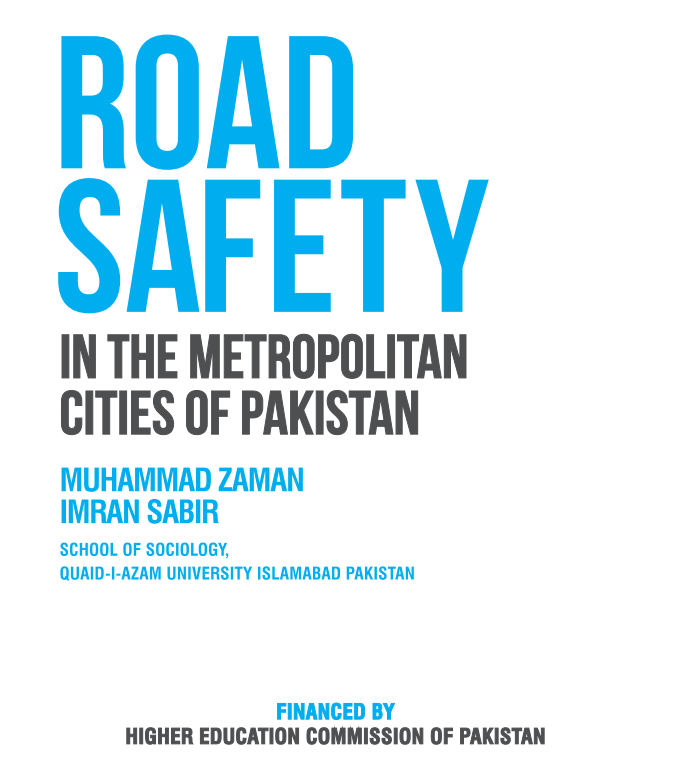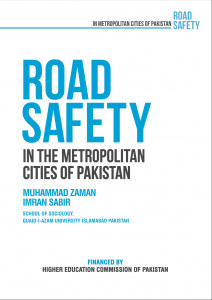Rampant urbanization, high population density, road crashes and traffic congestion have become serious issues in the contemporary world. In terms of the incidence of road crashes, Pakistan is one of the most at-risk countries, recording an estimated 27,000 deaths each year, owing to road crashes, it not only loses USD 9 billion per year which is equivalent to 4% of the GDP (Ministry of Communication, 2018; Zaman, 2019) but also experiences severe environmental degradation. These human and financial losses are higher than those which have been reported In the War on Terror. By 2018, the number of registered vehicles in Pakistan was recorded at 18 million with the number expected to rise up to 50 million in 2025 and up to 65 million by 2030. The current unbridled pace of urbanization and motorization has exacerbated road safety in Pakistan. Currently, the urban population in Pakistan stands at 37% which number is expected to rise by more than 50% by 2050. The population density in Pakistan is 251 per km2 and up to 25000 per km2 in metropolitan centers. Owing to Pakistan’s singular socio-economic and socio-cultural context, the menace of road safety violations is accompanied by a lack of in-depth understanding about what causes violation of law and road user carelessness in Pakistan. The lack of scientific knowledge about road usage makes it difficult to formulate and implement suitable policy measures for improving the behavior of road users. Along with identifying the factors involved in law breaking behavior of road users and drivers, the current study also strategizes suitable policy options to address the issue. Conducted by the Department of Sociology, Quaid-e-Azam University Islamabad in collaboration with HE?. This study found that traffic rule violations such as ignoring traffic signals, misuse of lanes, taking wrong U-tums, using mobile phones during driving and improper use of indicators were common practices amongst the commuters. This was further exacerbated by the lack of law enforcement, effective surveillance, or a deterrent penalty system. It was initially assumed by the researchers that the possession of a driving license from a recognized driving school was an important skill certificate for safe driving. However, the Knowledge, Attitude and Practices (KAP) survey was conducted to understand the Knowledge. Attitude and Practices of road users in five metropolitan cities of Pakistan (Islamabad, Lahore, Karachi, Peshawar, Quetta) found that every second driver on the road (49 percent) did not possess a valid driving license. Alarmingly, only two percent of the motorists had attended a recognized or registered driving school to learn how to drive, while a significant majority of the drivers (58 percent) had learnt to drive from friends and family. Analyzing the road accident history of the commuters, the researchers found that a lesser percentage (32%) of the licensed drivers had been involved in road accidents in comparison with a greater percentage (37%) of the unlicensed drivers. Interestingly, it was found that 67 percent of the drivers in metropolitan cities of Pakistan believed that it was destiny, rather than human errors, which caused road accidents. Eighty percent of the drivers also revealed that they drove at a speed of 50 km/h or more in urban areas even though this speeding limit in densely populated urban spaces comprises over speeding. While analyzing the knowledge and practice of commuters about road safety, the study also found that 30 percent of drivers were not acquainted with the speed limits in residential areas, and that 38 percent of the respondents admitted that they did not bother about traffic signals at all. Forty nine percent of the commuters also confessed that they could not remember emergency numbers in the event of road accidents. These findings demonstrate that road safety in Pakistan is extremely poor in terms of drivers’ knowledge, attitudes, and practices. To address this, robust and contextually suitable policy Interventions are urgently needed. In view of the policy vacuum on road safety, this study proposes several contextually suitable policy interventions with long-term impact regarding road safety.
The study proposes a Smart Parking Prototype Model for Islamabad that includes multi-story parking plazas to reduce traffic congestion. This model can reduce the number of vehicles on road, thus minimizing the chances of road accidents. Furthermore, a proposed Centralized Public Transport System utilizing existing transport buses of the educational institutions in Islamabad can also prove instrumental in mitigating the incidence of road accidents. Finally, the strict implementation of a model of effective and smart driving license issued upon completion of rigorous formal training and awareness about road safety is also warranted, as the findings suggest that many commuters lack knowledge of road safety rules and regulations. The proposed models will not only help the present generation to be more careful about road safety but also help to prepare the next generation for building a safe and accident-free Pakistan.


